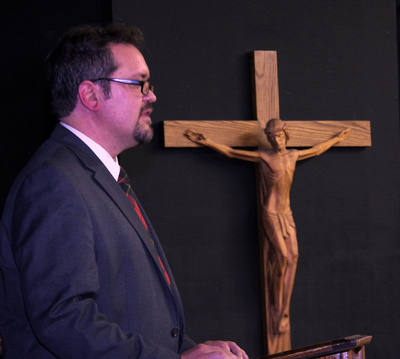 Esteemed Fathers and Faculty, Dear Students and Alumni, Kind Friends and Companions,
Esteemed Fathers and Faculty, Dear Students and Alumni, Kind Friends and Companions,
Welcome to St. Gregory’s.
For all of you who thought it was romantic or charming or amusing that St. Gregory’s has been a wild roving school for many a year, I have these choice words, “No, nay, never; No, nay, never, no more.” Home is the sailor, home from the sea, and the hunter home from the hill.
Thank you for coming to our graduation exercises where we will presently say goodbye to twenty excellent young men—who do have their flaws. As a boarding-school teacher, I have seen many arrive as boys and leave as young men. I have said goodbye so many times that I have grown, in a way, used to goodbyes. It is a hard truth, though I will not say it has hardened me. Goodbyes are still sad, but they do not pain me as they once did. I have seen, year in and year out, that “goodbyes” are not always forever, that endings are often beginnings. I have known the good of goodbyes. I recall when Mr. Hicks shook my hand, shook my whole arm, at my own graduation from this very stage nineteen years ago, and Mr. Clark reassured me as I cried out on the front lawn that this was only a beginning. I was heartbroken as I said goodbye—but if not for that heartbreak, I would never have returned. I recall when Mr. Hanisch gave a farewell address on this very stage five years ago. I was forlorn as I said goodbye—but if not for that forlorn feeling, I would never have joined the fight to reverse it.
And here we are—surrounded by old friends in our old home. Goodbyes are not forever if you trust in God. Every ending is a beginning if you choose it to be so. And here we are. And here you are, you Graduates. Today we graduate twenty young men from this old stage for the twentieth time. A class with six members who started out with us four years ago on a journey that marked an ending and a beginning—a journey that now ends even as another begins. Kolbe Costello, Paul Cummings, Mark Grenier, Aidan Kelly, Thomas Urgo, and Dominic Valentine, who traveled from Chestnut Grove to Pine Hill to Carpathian Village to Elmhurst Township.
And here we are—surrounded by old friends in our old home. Goodbyes are not forever if you trust in God. Every ending is a beginning if you choose it to be so. And here we are. And here you are, you Graduates. Today we graduate twenty young men from this old stage for the twentieth time. A class with six members who started out with us four years ago on a journey that marked an ending and a beginning—a journey that now ends even as another begins. Kolbe Costello, Paul Cummings, Mark Grenier, Aidan Kelly, Thomas Urgo, and Dominic Valentine, who traveled from Chestnut Grove to Pine Hill to Carpathian Village to Elmhurst Township.
Now listen, you Graduates, and you especially Kolbe. This is something to remember for your whole life. You have already lived it, but it is time you realized it. I would like to tell you about the last time I spoke with one who is with us here today, though invisibly: Kolbe’s father, Mark Costello, who fell asleep in the Lord two years ago. Mr. Costello was a good man and a remarkable friend, who was always and authentically eager for the success of this school. In many ways, he brought us to this success by his good faith. He loved to talk to me about getting this building back, and, as our school roved from place to place, every time we met, Elmhurst would come up, along with Mr. Costello’s strategy du jour, and they were many and varied. He always said we could scrape enough together when the time was right—and he was right.
The last conversation I had with Mr. Costello was about this very moment, the return of Gregory the Great to St. Gregory’s. We were at a rugby game, bundled up, standing in the wind together. He was wearing a plaid scarf and his black cap. As we watched the match, he was musing about the future, as he would do, and how great it would be when we would finally be able to make the big move back to Elmhurst. I always enjoyed these conversations. They gave me encouragement and hope.
Towards the end of the game, he said, “Well, I have to head to New York City now for my daughter’s beauty pageant.” I said, “You’re going from a rugby match to a beauty pageant? That’s quite a transition.” He said, “There’s really not much difference. One just has more lipstick.” Then he said, “You know, we’ll scrape enough together to buy that property when the time’s right, but let me ask you this: are you happy?” “Yes, I’m happy.” “No, are you happy?” He pointed to the boys on the field and along the sidelines. “All of you—are you happy? Going from place to place. A school with no home. Are you happy?” (I almost thought he said, “Are you crazy?” but, no, it was “Are you happy?”) “Yes,” I said, “we are happy, we are very happy. If I am sure of anything, and it’s not much these days, it is that we are happy.” “That’s good,” he said, as he pulled his trench coat around him. “Because somewhere or other Plato or someone said, if you’re not happy with what you have, you won’t be happy with what you want.” He shook my hand and walked away. I never spoke with him again. But I will never forget his last words to me. If you’re not happy with what you have, you won’t be happy with what you want. Those are words that resonate with our educational outlook. The happy life is rejoicing in the truth, paraphrasing St. Augustine’s Confessions: “The happy life is this—to rejoice to thee, in thee, and for thee.” Rejoice we have, and happy we have been, truly. And happy we are today, “we happy few, we band of brothers.”
St. Gregory’s might be the only school in the world that judges its wellbeing by the happiness of its students. Happy boys and a happy life is our measure of success. Happiness is our goal, for it is the goal of any true education. Here at St. Gregory’s, we remember our Penny Catechism when it comes to our raison d’être, the reason why we are. God made us to know Him, to love Him, and to serve Him in this world, and to be happy with Him forever in heaven. And that is why, even on this side of His grace, we rejoice as happy warriors. The world is so full of a number of things, I’m sure we should all be as happy as kings. St. Thomas Aquinas called happiness the end of life; but, still, there are ends in life. There are tears in things; times when we cry, “I will never laugh again, I will never laugh again.” Though loss is inescapable, there is also a sense in which things do not change or even diminish—in the heart of Christ, all things are made new.
Our school is in its new-old home thanks be to God, St. Gregory, St. John Bosco, St. Joseph, and all of you. Today, you new Graduates join the old ranks, to try your hands at greater things. Today you score a try. And I refer there to the rugby goal, ladies and gentlemen, which is called a “try;” as in, you dash and hew and smash with blood and fire, joy and tears, to place the ball behind a line in a field, earning the right and privilege of a try, an attempt, to kick the ball through the upright posts and perhaps earn a few more points—a few more points that, when roads diverge, may make all the difference, John Paul George. Even in scoring a goal, we only earn a try. Every ending is only a beginning. And happy we are to try and try. To try is the way of Odysseus, it is the way of the Cross, it is the way of Don Quixote.
To strive, to seek, to find, and not to yield.
There is a longstanding Highlander tradition when achievements are made on the field of battle, when the try is earned, our victors do not carry on and glory over their victory—for, as Jack Davis said last Sunday, it is not our victory, it is the Lord’s. Instead of exulting, the Highlanders happily prepare for future contests. After the match, they kneel in a dusty, arm-bound ring and lustily sing Psalm 115: “Not to us, O Lord, not to us, but to thy name give glory.” Today marks a great ending and a great beginning. You Graduates have scored a try for us and for many that will come after you—and we will try our best with this chance you have won to win glory for God’s Name by making many people happy.
I close with lines from Shakespeare’s Henry V and the Lord’s victory song:
Do we all holy rites;
Let there be sung ‘Non nobis’ and ‘Te Deum;’
The dead with charity enclosed in clay:
And then to Calais; and to England then:
Where ne’er from France arrived more happy men.Non nobis, Domine, Domine, non nobis, Domine,
Sed nomini, sed nomini, tuo da gloriam.
